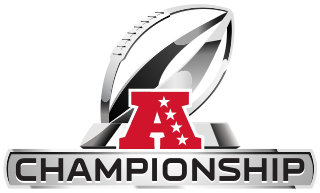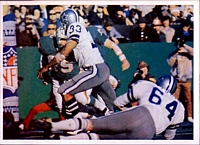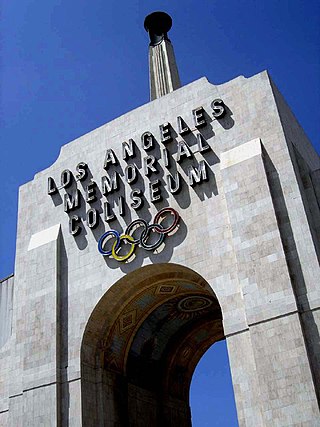
The American Football Conference (AFC) is one of the two conferences of the National Football League (NFL), the highest professional level of American football in the United States. The AFC and its counterpart, the National Football Conference (NFC), each contain 16 teams with 4 divisions. Both conferences were created as part of the 1970 merger between the National Football League, and the American Football League (AFL). All ten of the AFL teams, and three NFL teams, became members of the new AFC, with the remaining thirteen NFL teams forming the NFC. A series of league expansions and division realignments have occurred since the merger, thus making the current total of 16 teams in each conference. The current AFC champions are the Kansas City Chiefs, who defeated the Baltimore Ravens in the 2023 season's AFC Championship Game for their fourth conference championship and went on to win Super Bowl LVIII against the San Francisco 49ers.

The AFC Championship Game is the annual championship game of the American Football Conference (AFC) and one of the two semifinal playoff games of the National Football League (NFL), the largest professional American football league in the world. The game is played on the last Sunday in January by the two remaining playoff teams, following the AFC postseason's first two rounds. The AFC champions then advances to face the winners of the NFC Championship Game in the Super Bowl.
Willie Edward Lanier, is an American former professional football player who was a linebacker for the Kansas City Chiefs of the American Football League (AFL) and National Football League (NFL) from 1967 through 1977. He won postseason honors for eight consecutive years, making the AFL All-Star team in 1968 and 1969 before being selected to the Pro Bowl from 1970 through 1975.

The National Football League playoffs for the 1971 season began on December 25, 1971. The postseason tournament concluded with the Dallas Cowboys defeating the Miami Dolphins in Super Bowl VI, 24–3, on January 16, 1972, at Tulane Stadium in New Orleans, Louisiana.
The National Football League Coach of the Year Award is presented annually by various news and sports organizations to the National Football League (NFL) head coach who has done the most outstanding job of working with the talent he has at his disposal. Currently, the most widely recognized award is presented by the Associated Press (AP), although in the past several awards received press recognition. First presented in 1957, the AP award also gave out an award to coaches of the American Football League (AFL) from 1961 to 1969. The Sporting News has given a pro football coach of the year award since 1947 and in 1949 gave its award to a non-NFL coach, Paul Brown of the All-America Football Conference's Cleveland Browns. Other NFL Coach of the Year awards are presented by Pro Football Weekly/Pro Football Writers of America and the Maxwell Football Club. The United Press International (UPI) NFL Coach of the Year award was first presented in 1955. From 1960 to 1969, before the AFL–NFL merger, an award was also given to the most outstanding coach from the AFL. When the leagues merged in 1970, separate awards were given to the best coaches from the American Football Conference (AFC) and National Football Conference (NFC). The UPI discontinued the awards after 1996.
The 1992 NFL season was the 73rd regular season of the National Football League (NFL). Due to the damage caused by Hurricane Andrew, the New England Patriots at Miami Dolphins game that was scheduled for September 6 at Joe Robbie Stadium was rescheduled to October 18. Both teams originally had that weekend off. This marked the first time since the 1966 NFL season and the AFL seasons of 1966 and 1967 that there were byes in week 1.
Emmitt Earl Thomas is an American former professional football player and coach in the National Football League (NFL). He played college football at the now defunct Bishop College. He played professionally as a cornerback for the Kansas City Chiefs of the NFL. He owns the Chiefs all-time interception record with 58, which places him ninth on pro football's all-time list. Thomas was inducted to the Pro Football Hall of Fame after being nominated by the Seniors Committee.
From 1970 to 1984, United Press International (UPI) awarded the NFC Player of the Year award to players from the National Football League's National Football Conference (NFC). An NFC Defensive Player of the Year was named from 1975 to 1996, and an NFC Offensive Player of the Year, which replaced the overall player of the year award in 1985, was issued until 1996.
From 1960 to 1969, the United Press International (UPI) gave the annual AFL Player of the Year award in the American Football League, whose teams in 1970 became the American Football Conference (AFC) of the new National Football League (NFL).

The 1986 Pro Bowl was the NFL's 36th annual all-star game which featured the outstanding performers from the 1985 season. The game was played on Sunday, February 2, 1986, at Aloha Stadium in Honolulu, Hawaii before a crowd of 50,101. The final score was NFC 28, AFC 24.
The 1974 Pro Bowl was the NFL's 24th annual all-star game which featured the outstanding performers from the 1973 season. The game was played on Sunday, January 20, 1974, at Arrowhead Stadium in Kansas City, Missouri. The final score was AFC 15, NFC 13. The attendance for the game was 51,484 though nearly 70,000 tickets were sold.

The 1972 Pro Bowl was the NFL's 22nd annual all-star game which featured the outstanding performers from the 1971 season. The game was played on January 23, 1972, at Los Angeles Memorial Coliseum in Los Angeles, California. The final score was AFC 26, NFC 13.

The San Diego Chargers were a professional American football team in the National Football League (NFL). The Chargers played in San Diego from 1961 until the end of the 2016 season, before relocating back to Los Angeles, where the franchise had played its inaugural 1960 season. The team is now known as the Los Angeles Chargers.
The Kansas City Chiefs are a professional American football franchise that began play in 1960 as the Dallas Texans. The team was a charter member of the American Football League (AFL), and now play in the National Football League (NFL). The team is not related to the earlier Dallas Texans NFL team that played for only one season in 1952.
The Best NFL Player ESPY Award has been presented annually since 1993 to the National Football League player adjudged to be the best in a given calendar year, namely in the NFL season immediately precedent to the holding of the ESPY Awards ceremony.
The DC Touchdown Club, earlier known as The Touchdown Club of Washington, D.C., was started in 1935 with a passion for charity and sports. In the ensuing years the Club has benefited many local charities as well as providing scholarships to deserving student/athletes. The Touchdown Timmies, the club's trophies, are given each year to athletes who excelled in their respective arenas including professionals, college and scholastic players. Additionally, the Club provided monies to 15 charitable organizations each year.

The Kansas City Chiefs are a professional American football team based in Kansas City, Missouri. The Chiefs compete in the National Football League (NFL) as a member club of the league's American Football Conference (AFC) West division.
Several organizations give out NFL Defensive Player of the Year awards that are listed in the NFL Record and Fact Book and Total Football II: The Official Encyclopedia of the National Football League. The Associated Press (AP) has been giving the award since 1972; Pro Football Writers of America/Pro Football Weekly since 1970; and Sporting News has announced winners since 2008. The Newspaper Enterprise Association was the originator of the award in 1966. However, it became defunct after 1997. Also going defunct was the United Press International (UPI) AFC-NFC Defensive Player of the Year Awards that began in 1975.
The Mob Squad is a nickname that was officially used by the Los Angeles Rams of the National Football League during both their last season in St. Louis and their first seasons back in Los Angeles. The nickname referred to the team's return to glory in Los Angeles under such players as Aaron Donald, Todd Gurley, Jared Goff, Cooper Kupp, and head coach Sean McVay. The naming also extends to fans of the Rams, primarily used by multiple booster clubs around Southern California.